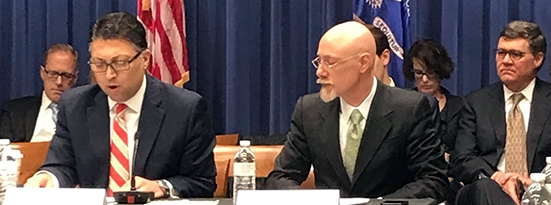Roundtable on Antitrust Consent Decrees
RFK Department of Justice Building, Room 7411
950 Pennsylvania Avenue NW
Washington, DC 20530
United States
Event Details

Related pages:
Roundtable Information
The second roundtable in the series focused on antitrust consent decrees, including the regulatory nature of consent decrees that involve behavioral remedies. The Antitrust Division identified nearly 1,300 perpetual consent decrees still in effect, some over 100 years old. The roundtable considered the propriety of such consent decrees and their role in a dynamic market economy.
Date and Location
|
April 26, 2018 |
Room 7411 |
Roundtable Agenda
|
10:00 a.m. |
Makan Delrahim, Assistant Attorney General for Antitrust |
|
10:20 a.m. |
Introductions and Statements from Roundtable Participants |
|
11:00 a.m. |
Session 1 – Behavioral Consent Decree Provisions This session will explore two main issues: first, how consent decrees have been used, what the trends are, and what we have learned from trying various approaches, including the differences between structural and behavioral forms of relief; second, how antitrust enforcement should employ consent decrees going forward. Much of this discussion may focus on perceived changes in the Antitrust Division’s revisions of its policies on merger remedies as well as the commentary and literature regarding specific behavioral remedies in both non-merger and merger settlements, for vertical and horizontal mergers. |
|
12:00 p.m. |
Break |
|
12:15 p.m. |
Session 2 – The Usefulness of Perpetual Consent Decrees, and Terminating Outdated Decrees We will examine what effects perpetual decrees have on market competition. This may include a discussion of how companies subject to perpetual decrees adjust their business conduct versus how they would do business not subject to the decree, or subject to a time-limited one, and the role industry reliance on a decree should play with respect to the decision to eliminate or retain a perpetual decree. This session may consider specific perpetual consent decrees, but also broader questions of the effects that perpetual decrees can have in the marketplace. In addition, this session may discuss the Division’s Judgment Review Project and the considerations the Division should apply in determining whether a consent decree should be terminated or retained. |
|
12:45 p.m. |
Closing Statements from Roundtable Participants |
Roundtable Participant Statements
American Bar Association, Section of Antitrust Law: Jon Jacobson
American Antitrust Institute: Diana Moss
American Enterprise Institute: Jeffrey Eisenach
Consumers Union: George Slover
Open Markets Institute: Brian Feldman
Public Knowledge: Meredith Rose
U.S. Chamber of Commerce: David Wales
Public Comment Submissions
The Department of Justice welcomed comments in advance of each of the roundtables. The Department accepted public comments (not to exceed 20 pages) regarding the second roundtable until April 25, 2018. The comment period is now closed.
REG2-0001 Phoenix Center
REG2-0002 Global Antitrust Institute
REG2-0003 CCIA
REG2-0004 Dan Ducore
Privacy and confidentiality: Written submissions and the identity of the submitter may be disclosed, reproduced, and distributed by publication and/or posting on the Department of Justice website, at the discretion of the Department of Justice. Information that is submitted in connection with this event cannot be maintained as confidential by the Department of Justice. Written submissions should not include any information that the submitting person seeks to preserve as private or confidential.

 U.S. Department
of Justice
U.S. Department
of Justice